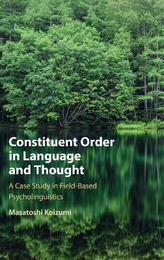
|
Constituent Order in Language and Thought: A Case Study in Field-Based Psycholinguistics
Hardback
Main Details
| Title |
Constituent Order in Language and Thought: A Case Study in Field-Based Psycholinguistics
|
| Authors and Contributors |
By (author) Masatoshi Koizumi
|
| Physical Properties |
|
| Category/Genre | linguistics
Psycholinguistics
Grammar and syntax |
|---|
| ISBN/Barcode |
9781108844031
|
| Classifications | Dewey:401.9 |
|---|
| Audience | | Tertiary Education (US: College) | |
|---|
| Illustrations |
Worked examples or Exercises
|
|
Publishing Details |
| Publisher |
Cambridge University Press
|
| Imprint |
Cambridge University Press
|
| Publication Date |
19 January 2023 |
| Publication Country |
United Kingdom
|
Description
Traditionally, due to the availability of technology, psycholinguistic research has focused mainly on Western languages. However, this focus has recently shifted towards a more diverse range of languages, whose structures often throw into question many previous assumptions in syntactic theory and language processing. Based on a case study in field-based comparative psycholinguistics, this pioneering book is the first to explore the neurocognition of endangered 'object-before-subject' languages, such as Kaqchikel and Seediq. It draws on a range of methods - including linguistic fieldwork, theoretical linguistic analysis, corpus research, questionnaire surveys, behavioural experiments, eye tracking, event-related brain potentials, functional magnetic resonance imaging, and near-infrared spectroscopy - to consider preferred constituent orders in both language and thought, examining comprehension as well as production. In doing so, it highlights the importance of field-based cross-linguistic cognitive neuroscientific research in uncovering universal and language-particular aspects of the human language faculty, and the interaction between language and thought.
Author Biography
Masatoshi Koizumi is Professor of Linguistics and Brain Science at Tohoku University, Japan. His research interests include grammatical theory and neurocognition of language. He is currently engaged in field-based cognitive neuroscience research on understudied languages.
|